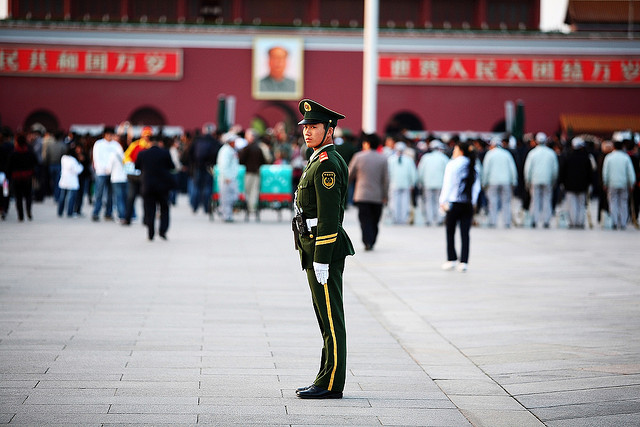Beijing’s anti-corruption drive: what’s at stake? (part 2)
Posted By Feng Zhang on September 29, 2015 @ 11:00
In the first instalment of this two-part series [2] I reflected on the CCP’s anti-corruption drive as part of an effort to underwrite the long-term legitimacy of CCP rule beyond the Xi leadership. But if enduring legitimacy is the motivation, it’s often asked why the focus is on anti-corruption and not also on other aspects of national policy, like the economy and the environment? But that question overlooks the fact that anti-corruption is in fact not the sole focus of the Xi leadership.
In order to fully appreciate the role of anti-corruption in Xi’s new strategy of national governance, one must understand the so-called ‘four comprehensives’ theory proposed by the leadership early this year. The ‘four comprehensives’ are: comprehensively building a well-off (xiaokang) society, comprehensively deepening reform, comprehensively ruling by law, and comprehensively disciplining the party. The theory is now presented by the leadership as a new strategy for governing the country under the current circumstances. It’s almost a kind of grand strategy for CCP rule in China.
The ‘four comprehensives’ have logical connections with one another. Building a well-off society is the overarching goal, and deepening reform and ruling by law are two major means for achieving this goal. The CCP is the designer as well as executor of this strategy. But in order to enhance its legitimacy in this role, it must achieve self-restraint, self-innovation and self-development by comprehensively disciplining itself. Anti-corruption is a key strategic means of disciplining party members, and part of a broader—comprehensive—strategy for maintaining and enhancing CCP rule in China.
Viewed from the perspective of the ‘four comprehensives’, one can also detect an intriguing relationship between ruling by law and disciplining the party. In CCP politics, it’s often asked whether national laws or party rules take priority in practice. This is an extremely important question for understanding the nature of Chinese politics. But with respect to anti-corruption, the question is somewhat misleading. The CCP’s anti-corruption strategy is never about the rule of law: it’s fundamentally a political question about whether the party can successfully restrain its members and about the extent to which the leadership is willing to go to clean up the party.
Huge political risks and costs lie in wait, as is apparent from the arrests of top political and military leaders such as Zhou Yongkang and Xu Caihou. But the party is compelled to undertake the project, and even to elevate a specific strategy of anti-corruption to a comprehensive approach of ‘disciplining the party’. For, as Mr. Wang Qishan recognised, the legitimacy of the CCP as the sole ruling party of China requires it to discipline itself in order to gain and enhance the trust of the people. For this reason, party rules and regulations, and associated moral education programs, necessarily come before national laws, although laws can play a useful complementary function of punishing and containing the spread of corruption. To CCP members, however, party rules lay down higher and stricter moral and behavioral standards than required by national laws. The CCP must maintain its purity and keep itself in the vanguard.
Wang Qishan and the top CCP leadership should be applauded for deploying a political vocabulary that is conducive to international and cross-cultural exchange. Breaking the taboo of examining the legitimacy of CCP rule demonstrates the self-confidence and candidness of the leadership, as well as its sincerity to conduct a meaningful dialogue with the outside world. To make the narrative of a CCP accountable to the people more persuasive, however, the party must take the idea of the ‘endorsement of the people’ much more seriously.
How to deal with and respond to the ‘endorsement of the people’ is a huge challenge to the CCP. In essence, the CCP must create a mechanism or a set of institutions for measuring the degree of satisfaction of the Chinese people with a good degree of independence and fairness, and then to respond to public needs in a timely, creative and effectively manner. Only by doing so can the CCP build the long-term support of the people and maintain the legitimacy of its rule. Such moves will also help to foster a far more positive image of the CCP to the outside world than it is capable of projecting now.
Article printed from The Strategist: https://www.aspistrategist.org.au
URL to article: https://www.aspistrategist.org.au/beijings-anti-corruption-drive-whats-at-stake-part-ii/
URLs in this post:
[1] Image: http://www.aspistrategist.org.au/wp-content/uploads/2015/09/3535456689_af7db24c6f_z.jpg
[2] first instalment of this two-part series: http://www.aspistrategist.org.au/beijings-anti-corruption-drive-whats-at-stake-part-1/
Click here to print.
